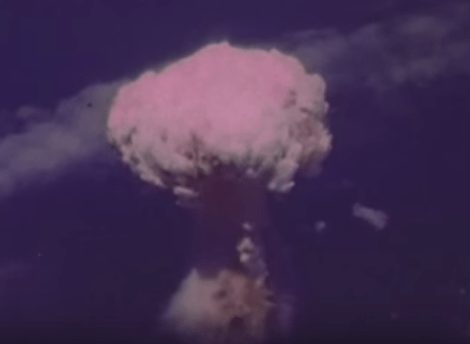'A Landscape in Hell': Lawrence Ferlinghetti's Eyewitness Account of Nagasaki Bombing Aftermath
Thursday, Aug. 9, marks the 73rd anniversary of the Nagasaki bombing. Last January, legendary beat poet Lawrence Ferlinghetti spoke with Truthdig’s Robert Scheer about the devastation in its wake as an observer on the ground, seven weeks after the nuclear attack. In his words, the experience made him an “instant pacifist”:
I was a navigator on an AKA troop transport with about 10,000 troops…. When we were past Hawaii and headed for Japan, we found out that we weren’t an attack force anymore, we were going to be an occupation force and didn’t have to fight. So we went into a little town called Sasebo, about three hours from Nagasaki by train.We didn’t know what atomic bombs were—no one did in those days. In the Navy, as in all other military establishments, they tell you just as much as you need to know to perform your part of a slaughter or whatever other murderous commands you’ve been given. We didn’t know anything. We went ashore and there was no one there. The whole town was boarded up, there wasn’t a Japanese in sight.When we went over to Nagasaki, it was total devastation. It was like a landscape in hell. What was left of bodies had all been cleared away by the time we got there, which was about seven weeks after the bomb had been dropped…. It was acres of mud, with bones and hair sticking up out of it. And as I’ve said before, it really made me an instant pacifist. Up to that time, I’d been a good American boy, in the boy scouts, etc…Nagasaki really woke me up.
Listen to their full interview here.
Here’s an Associated Press report on the anniversary.
TOKYO — Nagasaki commemorated the anniversary of the world’s second atomic bombing Thursday with the United Nations chief and the city’s mayor urging global leaders to take concrete steps toward nuclear disarmament.
Secretary-General Antonio Guterres, the first United Nations chief to visit Nagasaki, said fears of nuclear war are still present 73 years after the Nagasaki and Hiroshima bombings and that the attacks should never be repeated. He raised concerns about slowing efforts to denuclearize, saying existing nuclear states are modernizing their arsenals.
“Disarmament processes have slowed and even come to a halt,” Guterres told the audience at the Nagasaki peace park. “Here in Nagasaki, I call on all countries to commit to nuclear disarmament and to start making visible progress as a matter of urgency.” Guterres added that nuclear weapons states should take the lead. “Let us all commit to making Nagasaki the last place on Earth to suffer nuclear devastation,” he said.
More than 5,000 citizens, including Nagasaki atom bomb survivors, and representatives of about 70 countries remembered the victims as they observed a minute of silence at 11:02 a.m., the moment the plutonium bomb Fatman hit the city.
Emperor Akihito joined a silent prayer from Tokyo with his wife Michiko as they monitored the ceremony on TV, marking the last Nagasaki commemoration before his planned abdication next April, Kyodo News reported.
The U.S. bombing of Nagasaki on Aug. 9, 1945, killed an estimated 70,000 people three days after a bomb dropped on Hiroshima killed 140,000. They were followed by Japan’s surrender, ending World War II.
Guterres said the peace and nuclear disarmament movement started by survivors of the atomic bombings has spread around the world but frustration over the slow progress led to last year’s adoption of the Treaty on the Prohibition of Nuclear Weapons.
Japan, despite being the only country in the world to have suffered nuclear attacks, has not signed the treaty because of its sensitive position as an American ally protected by the U.S. nuclear umbrella.
Nagasaki Mayor Tomihisa Taue urged Japan’s government to do more to seek nuclear disarmament, especially in the Asian region to help achieve a nuclear-free Korean Peninsula. He said citizens of the atomic-bombed cities are hoping to see North Korea denuclearized.
Taue urged Tokyo to sign the treaty and “fulfill its moral obligation to lead the world toward denuclearization.” He said more than 300 local assemblies have adopted resolutions calling on Japan to sign and ratify the treaty.
Japan seeks to close the gap between the views of nuclear and non-nuclear states about nuclear disarmament to eventually achieve a nuclear-free world, said Prime Minister Shinzo Abe, repeating almost the same phrase he used in a speech three days earlier in Hiroshima.
At a meeting later Thursday with Abe, an atom bomb survivor, or “hibakusha,” confronted the prime minister, asking how exactly he could bridge the divide while remaining under the U.S. nuclear umbrella.




Geen opmerkingen:
Een reactie posten